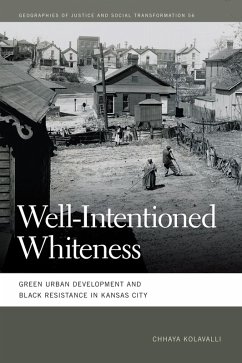This book documents how whiteness can take up space in U.S. cities and policies through well-intentioned progressive policy agendas that support green urbanism. Through in-depth ethnographic research in Kansas City, Chhaya Kolavalli explores how urban food projects-central to the city's approach to green urbanism-are conceived and implemented and how they are perceived by residents of "food deserts," those intended to benefit from these projects.
Through her analysis, Kolavalli examines the narratives and histories that mostly white local food advocates are guided by and offers an alternative urban history of Kansas City-one that centers the contributions of Black and brown residents to urban prosperity. She also highlights how displacement of communities of color, through green development, has historically been a key urban development strategy in the city.
Well-Intentioned Whiteness shows how a myopic focus on green urbanism, as a solution to myriad urban "problems," ends up reinforcing racial inequity and uplifting structural whiteness. In this context, fine-grained analysis of how whiteness takes up space in our cities-even through progressive policy agendas-is more
important. Kolavalli examines this process intimately and, in so doing, fleshes out our understanding of how racial inequities can be (re)created by everyday urban actors.
Through her analysis, Kolavalli examines the narratives and histories that mostly white local food advocates are guided by and offers an alternative urban history of Kansas City-one that centers the contributions of Black and brown residents to urban prosperity. She also highlights how displacement of communities of color, through green development, has historically been a key urban development strategy in the city.
Well-Intentioned Whiteness shows how a myopic focus on green urbanism, as a solution to myriad urban "problems," ends up reinforcing racial inequity and uplifting structural whiteness. In this context, fine-grained analysis of how whiteness takes up space in our cities-even through progressive policy agendas-is more
important. Kolavalli examines this process intimately and, in so doing, fleshes out our understanding of how racial inequities can be (re)created by everyday urban actors.
Dieser Download kann aus rechtlichen Gründen nur mit Rechnungsadresse in A, D ausgeliefert werden.

